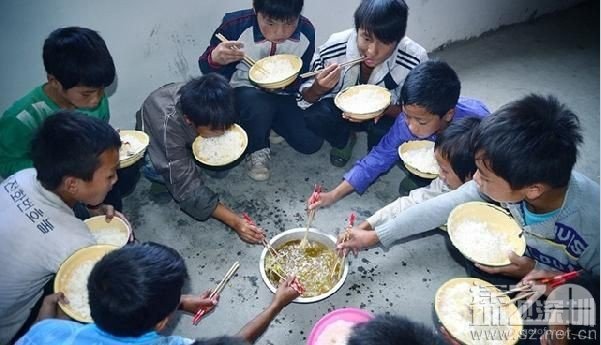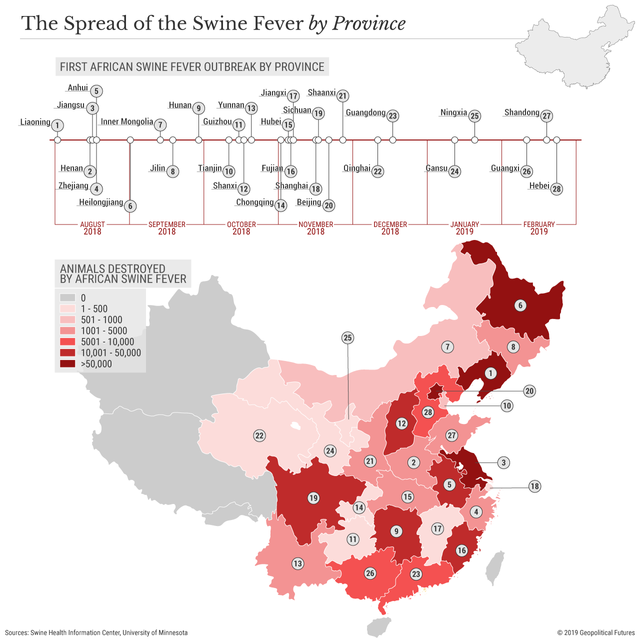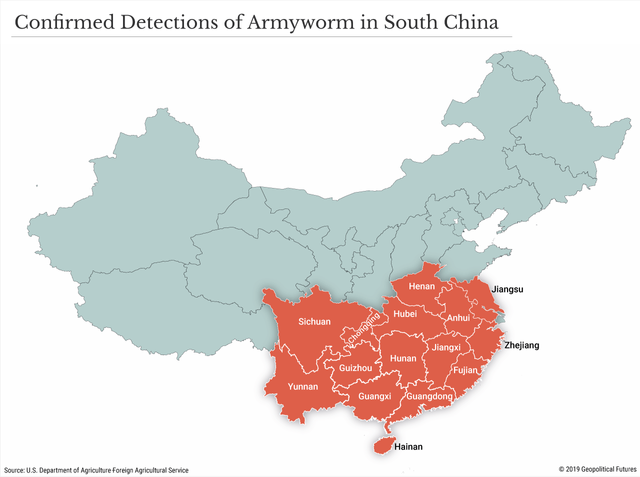Forget the Trade War - China Has a Bigger Problem: Starvation

There has been much ado recently over whether China will be able to hold out under the pressure of US tariffs on Chinese imports longer than US consumers will be able to bear the increase in prices. However, there is another factor putting far greater pressure on China, and it has little to do with their ongoing clash with the US. Simply put, China is in danger of mass starvation.
Spring of 2019 brought two back-to-back food crises, which have resulted in catastrophically rising food prices (Liu). This has caused some worry in China because, as Geopolitical Futures rightly pointed out, "this is particularly problematic because, perhaps more than any other economic pressure, a shock to food prices is the sort of thing that drives people to protest (GPF Staff)." Considering that Beijing is already dealing with civil unrest in Hong Kong in response to a separate issue (SCMP Staff), and this June marked an anniversary that already had Beijing on edge anyway, this was a worry that the Zhongnanhai Street Gang (more commonly known as 'the Communist Party of China') truly did not want.
Crisis #1: Pork
The first of the two crises that hit China's food supply was African Swine Fever, a crisis made all the more devastating by the Chinese government's botched response (Shapiro). Though there has been money shelled out to rebuild herds damaged by the plague according to a June 3 report from Reuters, little has been done to actually stop it. Many of China's elders still remember the Mao era, when meat of any kind was rationed (and extremely rare), so efforts to quarantine the disease have met with resistance, as these measures tend to remind the wealthy elites of this era they'd rather forget. To avoid meeting this resistance head-on, Beijing lawmakers have chosen the path China always takes when brute force doesn't work: lying. They have simply silenced all mention of the issue and pretended the problem did not exist (Cheung), even going so far as to arrest one man for "spreading an illicit video" simply for implying that a pile of dead pigs at a carcass disposal facility (which were in danger of being washed into a nearby river) died from ASF (Hao).

One of the greatest ironies of the outbreak of swine fever in China, it must be said, is that the news of the outbreak came immediately on the heels of China's decision to block pork imports from Canada (Reuters, SCMP) as an attempt to take revenge for Canada's arrest of China's "spy princess," Huawei CFO Meng Wanzhou.
Of course, China later attempted to save face by claiming the outbreak of ASF was precisely the reason for the crackdown on Canadian Pork (CBC Staff). There are two reasons to doubt this. The first is that China's declaration to this effect came out on June 4, a date when the Beijing government is desperate to wave its finger at a Western country in order to deflect the inevitable criticisms for the Tiananmen Crackdown. The second reason (and the more important reason) to doubt this claim is that while China is reeling from African Swine Fever, there has not been a documented case in Canada recently.
Crisis #2: Corn
"As if China’s African swine fever outbreak wasn’t enough to worry about, its agricultural sector is now facing down armyworm." This sentence from Xander Snyder at Geopolitical Futures puts the discovery of a corn-eating parasite in China's corn crops into perfect perspective. This pest, which has a history of claiming up to 10 percent of a nation's corn crop at a single feast, has been found in 18 Chinese provinces and is spreading rapidly, being expected to hit the nation's "corn belt" in July, where Corn farmers still have the Chinese government's mishandling of the African Swine Fever outbreak (see above) fresh in their minds.

However, it seems China is not willing to be caught doing nothing again so quickly, so this time, they have a bold and brilliant plan to eradicate the unwelcome corn-guzzling caterpillar: they plan to release hordes upon hordes of stink bugs, one of armyworm's natural predators, into the affected regions (Niu), to combat the wave.
You can't make this up, folks.
There are two rather glaring problems with this idea. The first is that stink bugs themselves are a destructive pest in their own right (Schulz). The second is that the last time the Communist Regime tried to take drastic measures to eradicate a crop-destroying pest only to find themselves plagued by another crop-destroying pest as a result (I am speaking of Mao's order to exterminate sparrows, which resulted in an Old-Testament-Scale plague of locusts descending on China with nothing to fear from sparrows), millions of Chinese starved to death (Platt).
Now, of course, both food crises have left China looking abroad for solutions. The shortage of pork -both in China and abroad- has made beef imports a suddenly more attractive option, and the blow to China's corn industry has left China considering importing corn. How convenient, then, that the United States (which currently holds a tenuous upper hand in a trade war with China and is looking for ways to tighten its hold) is one of the world's largest exporters of both corn and beef, both of which China suddenly has HUGE demand for...
While I personally doubt the US intelligence community is organized enough to have caused twin food crises of this scale with such precise timing, it's only a matter of time before some conspiracy theorist attempts to assert precisely that. Needless to say, the impact of these two events on China's food prices has been media fodder across the world.
What hasn't been in the news is the fact that China's food situation was perilous even before these two blows. Not only does China have a history of domestic food safety issues, ranging from contaminated baby formula (Chu, p. 180) to rat meat sold as mutton, to contamination of 10% of the nation's entire rice crop (Fenby, p. 105), but there is a question over whether they have the capacity to produce their own food at all.
Too Many People and Too Little Land
China has around 20 percent of the world's population but less than half that much of its arable land and renewable water, and, as we have seen, both of these vital resources are under threat.
-Jonathan Fenby, Will China Dominate the 21st Century?, p. 127
This quote from Hong Kong pundit Jonathan Fenby's fact-packed 2017 pamphlet already seems to show a nation struggling to feed its own population. China has 400 million hectares of grasslands, making up 41.65 of its total land area (Zheng, p. 14). That sounds like an impressive and stable statistic until one recalls that China has more than 3 times the combined population of all of North America. Put another way, China has 75% less arable land per capita than the global average (Wu, Sui & Zheng, p. 9), and even that slim figure is dwindling thanks to soil pollution (Fenby, p. 107) and groundwater contamination (Fenby, p. 103; Chu, p. 181). In fact, a growing number of Chinese farmers are not even willing to eat the food they produce because they know better than anyone the level of contamination in the soil it grew in and the water with which it was irrigated. Instead, they ship it to foreigners, preferring to "let the laowai poison themselves instead (Heyes)."
Yet it gets worse.
If one looks more closely at where this arable land is, one gets a glimpse of why China is so insecure about ethnic uprisings. Depending on how traditional a definition of "China" one uses, it would not be completely out of line to say more than 80% of "China's" arable land is not actually even in China.
The Tibet Autonomous Region holds 10,846,800 hectares (21.4% of the country's total) of the PRC's grasslands. Inner Mongolia (which, as its name suggests, traditionally was part of Mongolia, not China, and whose population is mostly Mongolian, not Han), Xinjiang (the Uighur Autonomous Region currently under the guns of a crackdown not unlike the one Tibet endured, which was once an independent nation and currently has a separatist movement) and Qinghai Province (which was once the Tibetan Province of Amdo) make up another 64.65% of the PRC's arable land (Wu, Sui & Zheng, p. 9).
Added together, 85.05% of the PRC's arable land is in ethnically-non-Chinese border areas!
So, to summarize, China has 1/4 of the land it needs to feed a population 4 times the size of North America (even if you include the enslaved minority regions the PLA currently has under military occupation), and what arable land they have is mostly toxic thanks to China's absolute lack of safety standards. The food they are able to produce from that land has a history of being toxified by chemicals, and now the limited food supply they are able to produce without poisoning it, is succumbing to disease. Oh, and the Chinese government's plan to combat this disease runs the risk of making the situation even worse, exactly as it did in the 1950's.
Living in Beijing I can personally attest to the pinch already being felt. Walking into grocery stores and finding that they have not gotten new shipments of food in two weeks and they are still out of the same food they were out of a week ago, is not uncommon. Empty shelves at convenience stores, where not only have foreign brands become scarce due to the trade war but even the local food brands are in short supply, is an everyday occurrence. And on the exceedingly rare occasion that I have the pleasure of going to a Burger King branch (Beijing doesn't have more than about a dozen, scattered across more land area than the State of Vermont), it is commonplace for days at a time now to hear "meiyuou niurou ('we don't have beef')," which prompts my response of "ni jiao 'Burger King, he ni meiyou 'burgers' (your name is 'Burger King' and you have no burgers)?" Food is skyrocketing in price where it is available, and it now requires a half hour trip just to find a place where it is available at all. I realize a half hour walk to get food is what the young folks call a 'First World Problem,' but it's one that the rest of the First World doesn't have, and which China didn't have until recently. The writing is on the wall.
China, now on the brink of widespread food shortages, can ill afford to lose these peripheral breadbasket regions, whose people have been given decades (and in some cases centuries) of reasons to hate their Chinese oppressors.
Imagine the danger China would be in if separatist movements in these peripheries, upon which China depends for their food supply, chose now as their moment to rise, organize and seek arms and assistance from a foreign power.
...a foreign power such as, perhaps, the military behemoth China has foolishly provoked a trade war with.
Sleep well, China.
Works Cited
CBC Staff. "China to Increase Examination of Canadian Pork Imports." Canadian Broadcasting Company. 4 June, 2019. Web, 14 June, 2019.
https://www.cbc.ca/news/canada/calgary/canada-beef-china-inspections-1.5162144
Cheung, Elizabeth. "Some 30 Percent of Pig Farms in Mainland China Rumoured to have been Hit by African Swine Fever and Hong Kong Lawmakers Demand Answers." South China Morning Post. 5 June, 2019. Web, 14 June, 2019.
https://www.scmp.com/news/hong-kong/health-environment/article/3013102/hong-kong-lawmakers-demand-answers-over-rumours
Chu, Ben. Chinese Whispers. London, 2013. Weidenfeld & Nicolson.
ISBN 978-1-7802-2474-9
Fenby, Jonathan. Will China Dominate the 21st Century? Cambridge, 2017. Polity Publishing.
ISBN 978-1-5095-1097-9
GPF Staff. "Daily Memo: 12 June, 2019." Geopolitical Futures. 12 June, 2019. Web, 14 June, 2019.
https://geopoliticalfutures.com/daily-memo-hong-kong-crackdown-us-poland-talks-chinese-inflation/
Hao, Nicole. "Chinese Detained After Suggesting Dead Pigs in Video Died From African Swine Fever." Epoch Times. 8 May, 2019. Web, 14 June, 2019.
https://www.theepochtimes.com/chinese-were-detained-because-publishing-dead-pig-video-media-worried-chinas-epidemic-will-impact-the-world_2899901.html
Heyes, J.D. "Contaminated Food From China Now Entering the U.S. Under the 'Organic' Label." Natural News. 30 October, 2016. Web, 14 June, 2019.
https://www.naturalnews.com/055818_tainted_food_organic_label_China.html
Liu Jiefei. "China’s Consumer Inflation Hits 15-Month High on Soaring Fruit Prices." Caixin Global. 12 June, 2019. Web, 14 June, 2019.
https://www.caixinglobal.com/2019-06-12/chinas-consumer-inflation-hits-15-month-high-101425748.html
Niu, Shuping. "Stink Bugs Could Be Unleashed to Battle China's Fall Armyworms." Bloomberg. 11 June, 2019. Web, 14 June, 2019.
https://www.bloomberg.com/news/articles/2019-06-11/stink-bugs-could-be-unleashed-to-battle-china-s-fall-armyworms?mc_cid=f7e794e2ae&mc_eid=ef19f840c9
Platt, John. "The Great Sparrow Campaign was the Start of the Greatest Mass Starvation in History." Mother Nature Network. 30 September, 2013. Web, 14 June, 2019.
https://www.mnn.com/earth-matters/animals/stories/the-great-sparrow-campaign-was-the-start-of-the-greatest-mass
Reuters Staff. "China to Offer Financial Support to Sow Farms to Rebuild Pig Herd." Reuters. 3 June, 2019. Web, 14 June, 2019.
https://www.reuters.com/article/china-swinefever/china-to-offer-financial-support-to-sow-farms-to-rebuild-pig-herd-idUSB9N22V010
Reuters. "China Blocks Imports from Two Canadian Pork Producers in Spat Since December 2018 Arrest of Huawei’s CFO Sabrina Meng." South China Morning Post. 2 May, 2019. Web, 14 June, 2019.
https://www.scmp.com/business/china-business/article/3008549/china-blocks-imports-two-canadian-pork-producers-spat
SCMP Staff. "As It Happened: Hong Kong Police and Extradition Protesters Renew Clashes as Tear Gas Flies." South China Morning Post. 12 June, 2019. Web. 14 June, 2019.
https://www.scmp.com/news/hong-kong/politics/article/3014104/thousands-block-roads-downtown-hong-kong-defiant-protest
Schulz, Kathryn. "When Twenty-Six Thousand Stinkbugs Invade Your Home." The New Yorker. 5 March, 2018. Web, 14 June, 2019.
https://www.newyorker.com/magazine/2018/03/12/when-twenty-six-thousand-stinkbugs-invade-your-home
Shapiro, Jacob. "China Struggles to Contain an Outbreak." Geopolitical Futures. 6 May, 2019. Web, 14 June, 2019.
https://geopoliticalfutures.com/china-struggles-contain-outbreak/
Snyder, Xander. "China, Corn and Caterpillars." Geopolitical Futures. 7 June, 2019. Web, 14 June, 2019.
https://geopoliticalfutures.com/china-corn-and-caterpillars/
Wu Li, Sui Fumin & Zheng Lei. Trans. David Gu. China's Economy. Beijing, 2008. China Intercontinental Press.
ISBN 978-7-5085-1304-1
Zheng Ping. Trans. Xiao Ying. China's Geography. Beijing, 2008. China Intercontinental Press.
ISBN 978-7-5085-1308-9
It is always a pleasure to see the "latest, greatest" post from you @patriamreminisci!
It is not just the great depth of detail and documentation, but your "straight up" style in how you choose to write it.
Some might attribute this ...
... to "bad luck." Or "bad karma" perhaps ... I prefer "divine intervention" ...
Where does all of this leave you? Any progress on possibly getting out of there?
P.S. Unrelated, but of potential interest to you, is the recent "disappearance" of the primary developer behind the Partiko app - a native of China. There have been various reports of what happened to him, but one is he went there on a visit ..
Posted using Partiko Android
Funny you mentioned it.
I actually was going to make a comment about the Swine Fever outbreak being possibly Karmic, given its timing, but opted to save my sarcasm for the end (I am trying, not always successfully, to adopt a scholarly tone and not let it be obvious that I am rubbing my hands together gleefully as I watch the self-anointed "Central Nation" get what they deserve, but considering that one of the nations China has a habit of bullying is my children's homeland, it's not always easy to stay detached and academic when writing these articles.
As for the disappearance of the Partiko app designer, this is the first I have heard of it but that definitely perks my interest. Given China's newfound desperation in the wake of their loss of access to US-made components, the disappearance of a cutting-edge app designer on a trip to China is certainly suspicious. The PRC does have a habit of detaining their native sons and daughters who go abroad for too long, if and when they return.
Yes well @ patriamreminisci ...
... I think you do an admirable job on the "scholarly" tone part. Although, I "read between the lines" for what lies beneath it ... 😉
On the "disappearance," just a quick note to say that was something I saw, but nothing definitive, at least as far as I am aware. I've had a number of interactions with him personally over time (including an offer to give me a tour of his hometown - the city of Xi'an ...). I reached out via the Chat feature (since I was a very early adopter of Partiko Android) to him directly, but ... So far, nothing and that is just not like him ...
Nice to see you have been getting some support on this great post, including @c-cubed's June 14th highlights post. Keep up the great work!
P.S. Not sure how familiar you are with some of the "tools" you can use to keep track of your "mentions," etc. I am happy to help you with some ideas, if interested ...
This post was shared in the Curation Collective Discord community for curators, and upvoted and resteemed by the @c-squared community account after manual review.
@c-squared runs a community witness. Please consider using one of your witness votes on us here
@patriamreminisci, Starvation is most painful aspect and hope that China will come out of this situation. Specially when we see children starving then it gives deep pain. Stay blessed.
They haven't hit the starvation point yet, and there's still time to avoid it. However, their current policies seem inclined in a direction that will exacerbate the food shortages already beginning to rumble.
Hope that they will not reach to that point and everything will move towards the balanced levels.
Have a wonderful time ahead.